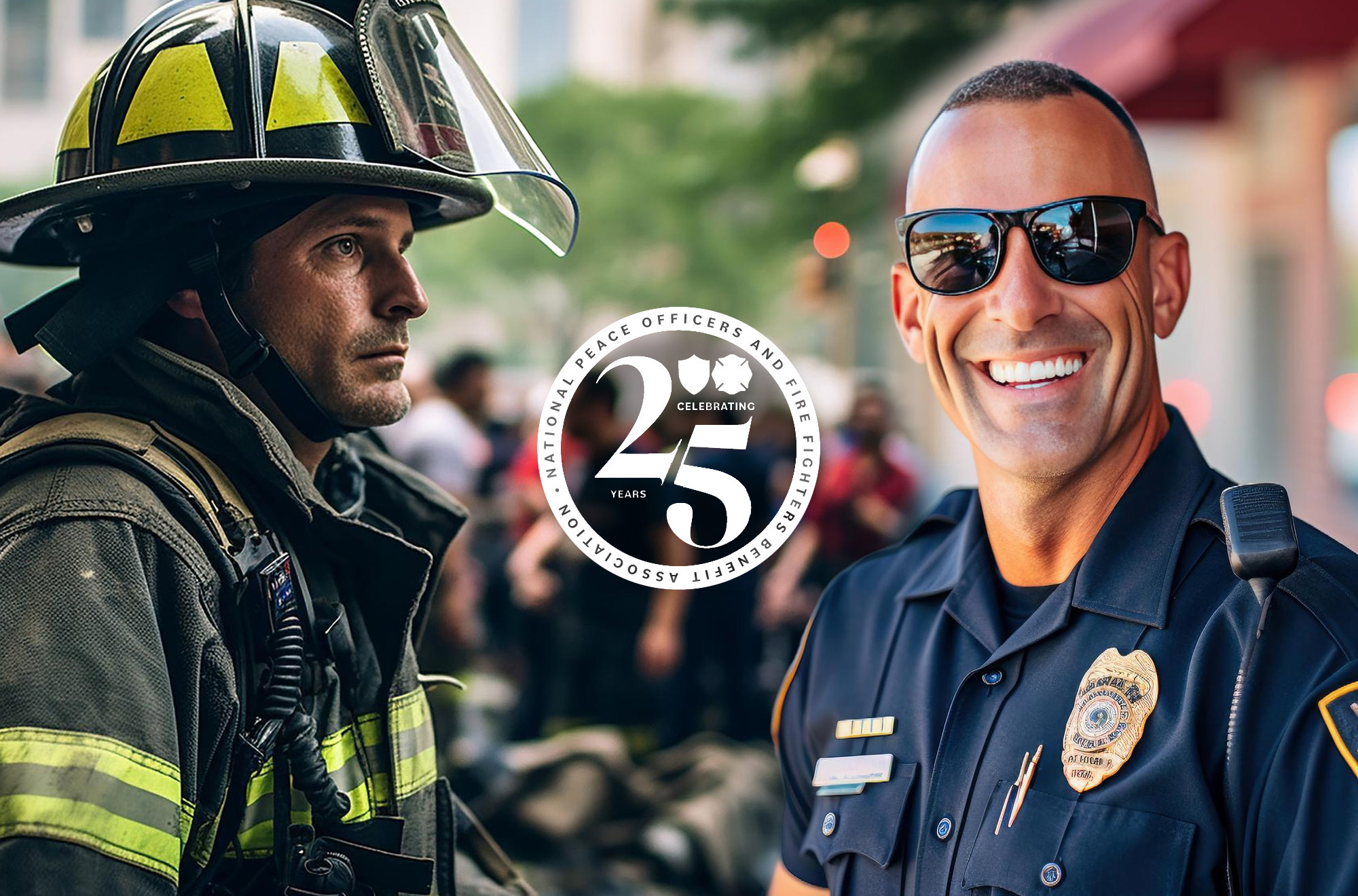NPFBA has spent 25 years helping California’s bravest build incredible careers and lives and protecting them with Long-Term Care. And as a member-managed association of career firefighters and law enforcement officers, we serve from the frontlines, not the sidelines. Now, we’re passing on the hard-earned wisdom to you. Buckle up for 25 points of no-nonsense advice that’ll set you up for success, both on and off duty.
1. Network Like Your Career Depends on It (Because It Does)
In this field, who you know can be just as important as what you know. Build relationships across departments, ranks, and even outside your profession. You never know where your next opportunity (or lifeline) will come from.
Do This – Attend one professional networking event per quarter. Set a goal to make three new meaningful connections each time.
2. Master the Art of Sleep
Quality sleep isn’t a luxury – it’s a necessity, especially with irregular shifts. Poor sleep can impact your decision-making, reflexes, and overall health. Prioritize it like you would any other crucial aspect of your job.
Action Step – Create a sleep-friendly environment at home. Invest in blackout curtains, a white noise machine, and comfortable bedding. Your body is your most important piece of equipment – treat it that way.
3. Develop a Personal Board of Directors – Listen to Wisdom
You wouldn’t make major decisions for your department alone, so why do it for your life? Assemble a trusted group of mentors, financial advisors, and friends who can offer guidance and perspective.
Do this – Identify 5 people whose wisdom you respect in different areas of life. Reach out and ask if they’d be willing to be part of your personal advisory board.
4. Invest in Your Team
Your colleagues are more than just co-workers – they’re your second family. Invest time in building strong, supportive relationships. These bonds will sustain you through tough times and enrich your career.
Team-Building Challenge – Organize a monthly off-duty activity for your unit. Rotate planning duties to share the load and mix things up.

5. Hone Your Emotional Intelligence & Learn to Read Your Team
In high-stress situations, your EQ is just as important as your IQ. Learn to read people, manage your own emotions, and communicate effectively. It’ll make you a better first responder and leader.
Practice This – At the end of each shift, reflect on one emotional challenge you faced. How did you handle it? How could you improve?
6. Family First, Always
Long hours, high stress, and unpredictable schedules can wreak havoc on relationships. Make a conscious effort to prioritize your loved ones. They’re your real pension – the ones who’ll be there long after the job’s done.
Do This Now – Schedule a weekly “sacred” family time that’s non-negotiable. No phones, no work talk, just quality time.
7. Build a Life Outside the Job
Your badge is part of you, not all of you. Cultivate interests, hobbies, and relationships outside of work. It’ll make you a more well-rounded person and give you something to look forward to in retirement.
Challenge – Pick up a new hobby this month that has nothing to do with your job. Woodworking, painting, learning a language – whatever sparks joy.
8. Invest in Your Community Off-Duty
Your impact doesn’t have to stop when you clock out. Engaging with your community in positive ways off-duty can provide personal fulfillment and help bridge the gap between first responders and the public.
Try This – Volunteer for a local youth program or community organization. Use your skills to make a difference in a new context.
9. Start Planning Yesterday
You wouldn’t rush into a burning building without a game plan, so why treat your future any differently? The second you pin on that badge or don that uniform, start thinking long-term. Your 50-year-old self will thank you for every smart decision you make today.
Action Item – Set up an automatic transfer of 10% of your paycheck into a dedicated retirement account. Future you just got a lot richer.
10. Plan for the Day After Retirement
Retirement isn’t just about having enough money – it’s about having a purpose. Many first responders struggle with the transition. Start thinking now about what will give your life meaning beyond the job.
Reflection Exercise – Write a detailed description of your ideal day in retirement. What are you doing? Who are you with? Use this vision to guide your long-term planning.
11. Your Pension Probably Isn’t Enough
Sure, that pension looks shiny now, but inflation’s a sneaky beast. Don’t bet your entire future on one horse. Diversify like your life depends on it – because it does.
Reality Check – Calculate how much your pension will actually be worth in 30 years, accounting for inflation. Spoiler alert: It’s less than you think.
12. Plan for Multiple Careers
The days of 30 years and out are changing. Many first responders are starting second careers after retirement. Start thinking about what you want to do next, and acquire skills now that’ll set you up for success later.
Action Item – Shadow someone in a field you’re interested in for your second act. Use your connections to explore possibilities.

13. Expect The Unexpected: Youth Isn’t Forever
Right now, you’re invincible. You’re the hero, the one who saves the day. But here’s the plot twist – time is the one villain you can’t outrun. It’s hard to imagine now, but those joints will creak, that back will ache, and one day, you might need help with daily tasks.
2 Action Items For This One
Action Step – Run the numbers and Make a plan for if your super-human body fails, or if you’re injured on or off the job, during your career or in retirement. What if you need long-term care or disability? Calculate the cost of being benched from the job or unable to care for yourself, in your area for one year. Then multiply that by a few years. Shocked? That’s why you need a plan.
Here’s a stat that’ll wake you up faster than a 3 AM call: 70% of people over 65 will need long-term care. Think your savings can handle $100k+ a year for care? Yeah, neither can most people. Long-term care insurance isn’t sexy, but it’s the bulletproof vest for your retirement.
Do This Now – Review NPFBA’s long-term care plan details. It’s cheaper than you think, especially when you’re young and healthy. If you’re ready, fill out the application and get it checked off your list.
14. Side Hustles – Not Just for Hipsters
Your skills are valuable beyond the badge. Teaching, consulting, or even starting a business related to public safety can provide extra income and a safety net. Plus, it keeps your mind sharp and your options open.
Brainstorm – List five ways you could monetize your skills outside of your regular duties. Pick one and make a plan to launch it within six months.
15. Physical Fitness is Financial Fitness – Maintain Your Health
Your body is your most valuable asset. Treat it like the million-dollar machine it is. Every workout is an investment in lower healthcare costs and a longer, more active retirement. Regular check-ups aren’t just for your equipment. Your body needs maintenance too. Don’t skip those annual physicals, dental visits, and health screenings. Catching issues early can save your life and your wallet.
2 Action Items For This One
Challenge – Track your workouts for a month. Aim for 150 minutes of moderate exercise per week. Your heart (and wallet) will thank you.
Regular check-ups aren’t just for your equipment. Your body needs maintenance too. Don’t skip those annual physicals, dental visits, and health screenings. Catching issues early can save your life and your wallet.
Schedule This Now – Book your next physical, and set recurring reminders for annual check-ups. Your future self will thank you.

16. Master the Art of Stress Management
Chronic stress isn’t just part of the job – it’s a silent killer. It’ll eat away at your health, relationships, and performance if you let it. Develop a toolkit of stress-busting techniques that work for you.
Try This – Learn box breathing (4 seconds inhale, 4 hold, 4 exhale, 4 hold). Practice for 5 minutes daily, especially before high-stress situations. If it’s good enough for Navy Seals, it’s good enough for you. Get some.
17. Mental Health – The Invisible Battle
PTSD, depression, anxiety – they’re not signs of weakness, they’re occupational hazards. Ignoring them is like ignoring chest pain. It’ll only get worse. Prioritize your mental health like you do your physical training.
Action Item – Find a therapist who specializes in first responder mental health. This may take a couple of tries to find a therapist you like and trust. That doesn’t let you off the hook for getting the reps in. Find one. Schedule a check-in, even if you feel fine. Prevention is key.
18. Learn to Advocate for Yourself
You’re used to being a voice for others, but don’t forget to speak up for yourself. Whether it’s for a promotion, better working conditions, or your health needs, self-advocacy is a crucial skill.
Practice This – Dry Dive (role-play/practice) having difficult conversations, debates and discussions with a trusted colleague. Practice articulating your needs and achievements clearly and confidently.

19. Learn the Power of ‘No’ to Optimize Your Life and Work
You’re hardwired to say ‘yes’ to every call for help. But sometimes, saying ‘no’ is the bravest thing you can do. Set boundaries to protect your time, energy, and mental health. Unapologetically hitting on the eject button on the non-essential things and people in your life, can go a long way to optimal operations and abundant living.
Try This – For one week, say ‘no’ to any non-essential requests that don’t align with your top priorities. Notice how it feels and what you gain.
20. Continuous Learning is Your Secret Weapon
The world’s changing faster than ever. Stay ahead of the curve or get left behind. Whether it’s new tech, leadership skills, or specialized certifications, never stop leveling up.
Challenge Yourself – Learn one new skill every six months that makes you more valuable to your department or opens up new career paths.
21. Financial Literacy is Your Best Defense
You’re trained to protect and serve, but are you protecting your financial future? Understanding investments, taxes, and retirement planning isn’t just for Wall Street types. It’s your ticket to long-term security.
Challenge Yourself – Aspire to learn something new about personal finance, retirement planning, and bulletproof abundant living each week. Need help? We got you. Opt-in and sign up to receive our emails and never miss an informative post.
22. Embrace Technology, Don’t Fear It
The tools of your trade are evolving rapidly. Stay ahead of the curve by embracing new technologies. It’ll make you more efficient on the job and more adaptable in your career.
Do This – Identify one new technology in your field and become the go-to expert in your department. Be the change-maker, not the change-resistor.

23. Build Your Personal Brand
In today’s connected world, your reputation extends beyond your department. Cultivate a positive, professional presence both online and offline. It can open doors for advancement, side opportunities, and post-retirement careers.
Do This – Audit your online presence. Ensure your social media profiles reflect the professional image you want to project. Consider creating content that showcases your expertise and experiences as a first responder
24. Give Back, But Don’t Give It All
Your instinct is to serve others – it’s why you chose this path. But remember, you can’t pour from an empty cup. Find ways to contribute to your community that don’t drain your own resources.
Try This – Volunteer for a cause you care about, but set clear boundaries on your time and energy. Aim for sustainable impact, not burnout.
25. Embrace the Power of Habits – Establish Healthy Routines
In a job where every day can bring the unexpected, establishing solid routines can be your anchor. Create morning and evening rituals that center you, prepare you for the day ahead, or help you decompress.
Try This – Develop a 15-minute morning routine that includes physical, mental, and emotional preparation for your shift. Stick to it for 30 days and watch your performance improve.

The Bottom Line
Thirty points of wisdom for thirty years of service – each one a testament to the challenges, triumphs, and unique experiences of life as a first responder. But here’s the real secret: this journey of growth and self-improvement never ends. Just as you continually train to stay sharp on the job, your personal development is a lifelong pursuit. So, take these lessons to heart. Implement them one by one. Build the future you deserve.
Remember, true strength isn’t just about physical prowess or tactical skills. It’s about building a life that can weather any storm – on duty and off. It’s about creating a future where you’re as prepared for what lies ahead (retirement or 2nd career) as you are for your next shift.
These insights aren’t just tips – they’re a roadmap to a life well-lived, both in uniform and out. They represent the collective wisdom of countless individuals who’ve walked the path before you, facing the same challenges, fears, and hopes that you do now. For over 20 years, we’ve seen firsthand how applying these principles can transform not just careers, but lives. We’ve witnessed brave men and women transition from active duty to fulfilling retirements, secure in the knowledge that they’re prepared for whatever comes next.
Stay safe, stay strong, and let’s build a future that honors your service and secures your legacy. Don’t wait for a wake-up call to start protecting your future. Take action today, because the life you save might just be your own.




